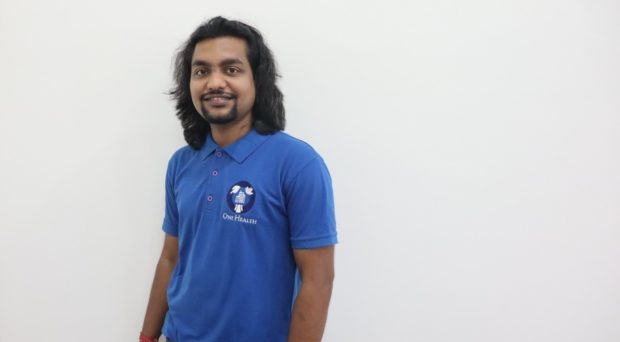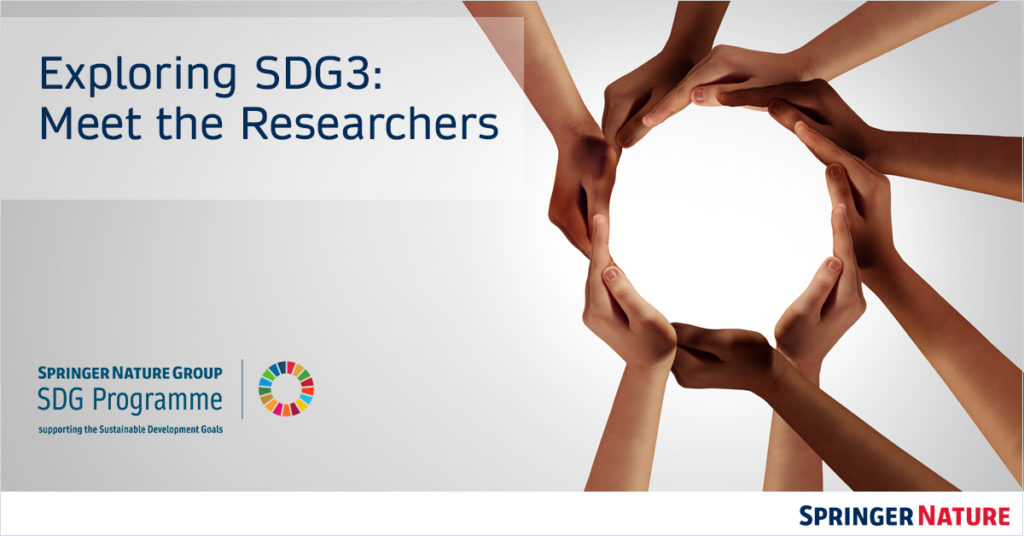
欢迎来到我们Meet the SDG3 researcher博客集合。我们正在采访一系列在不同领域工作的学者和从业人员,以实现Sustainable Development Goal 3:确保健康的生活并促进所有年龄段的人。您可以在此集合中找到其他帖子here,并发现Springer自然在迈向实现这一目标的bob游戏平台进步方面所做的一切SDG3中心.
Please tell us a bit about yourself.
I am a researcher interested in the trans-disciplinary issues on One Health. It took me a while to identify this as the area in which I wanted to contribute. Conventional health science disciplines felt somewhat limited to tackle the complex and urgent health issues we need to address collectively. As a Physiotherapist by graduation, I started my career as a clinical therapist in one of the clinics in Eastern India. As with others, I used to diagnose, treat, and rehab cases within a clinical setup, and my mindset revolved around a patient- and disease-centric approach.

Gradually, this evolved into considering the growing importance of preventive care, which led me to pursue further studies in the field of public health. I started a Master’s in Public Health specializing in Occupational and Environmental Health from the southern part of India. This platform provided me with an opportunity to understand the dynamics of risk in a broader sense, including the principles of preventive medicine and research methods. Although this transformation from clinical to preventive science was hard to digest for me at first, the viable environment of public health made me learn different aspects of health and disease. That was when I started to think out of the box about the diversity of risk factors and their dynamics on health, beyond disease.
With the post-graduation degree, I started my research career where I was involved in theimpact evaluation的apublic-private partnershipformaternal healthcare, withinhealth system research. Gradually, my work provided me with opportunities for exposure to otherSouth-East Asian countrieslike Bhutan, Sri Lanka, Thailand and helped me learn public health skills.

The initial half-decade journey as a young public health professional in the research field provided me with an essential platform to understand the significance of emerging risk dynamics to resolve public health issues. I have been part of diverse research groups during this wonderful journey involvinghealth system issues,infectious diseases,maternal and child health,adolescent health,environmental和occupational health,non-communicable diseases和global healthwith an interdisciplinary approach. I was fortunate enough to avail, two prestigious fellowships (Operational Research Fellowship-2015, India, and EBQ- VLIR-UOS Scholar-2016, Belgium).

为了进一步拓展我的视野,我开始我的医生al research in the field of One Health at the University of Bonn, Germany, in 2017. Being a health graduate with experience in clinical and public health research, entering the world of One Health was a mesmerizing experience for me during the early days. Over time, this became my critical area of interest.
Although the One Health concept was originated from the idea of ‘one medicine’, its main focus is on a morecomprehensive vision of human, animal, and environmental healthfor a healthier ecology. My key focus during my research was onhealth systems research和the principles of systems approach, exploring theconvergencefor effective prevention and control ofzoonotic diseases. The wider applications ofOne Health持续的COVID-19 pandemic. The research I carried out in the一个健康领域enabled me tounderstand and appreciatethe in-depthinterconnectedness的human health with animals and the environment.
In December 2020, I successfully defended my doctoral thesis at the Global Health, Institute for Hygiene and Public Health (IHPH), University Hospital Bonn, Germany. After earning my doctoral degree, I returned to my home country in early 2021. In continuation, I have facilitated the Center for One Health Education, Research, and Development (COHERD) establishment at the IIPHG, a unique center involved in global South-North collaboration.
How does your work relate to SDG3?
My works have always been closely interrelated to SDG3 on several fronts. When I started my public health career, I was fortunate to be provided a chance to work on a project namedMATIND(Maternal health in India) Evaluation of state-led Public-Private Partnership scheme Chiranjeevi Yojana in Gujarat, India, which directly relates to the SDG 3.1, 3.7, and 3.8.

As I began to work more closely on SDG 3.3, 3c, and 3d on issues related toWater, Sanitation, and Hygiene(WASH) and diseases likeHepatitis,Tuberculosis,登革热, andSickle cell disease, I started envisaging myself becoming a health system researcher. My work resonated with other SDGs, such as integrating SDG 6 (Sanitation for all) with SDG 3 (Good health and well-being) througha study on randomized trialsfor improving toilet use in rural Gujarat, India.
These connections culminated in understanding the emerging risk dynamics to resolve public health issues. The other project where I have worked on was about theassessment of country capacityin initiating integrated disease surveillance system with climate data for Bhutan, Sri Lanka, Thailand, thus making SDG 3.3, 3c and SDG 13 converge, and this expanded my understanding of the complex linkages of health issues.
Progressing further, I explored the importance of SDG 17 (especially 17.6 and 17.14) for improving the SDG 3 targets through my doctoral research, abbreviated asRICOHA study, (Research to explore Intersectoral collaborations for One Health Approach) in India. One Health also emphasizes the connections across multiple SDGs such as SDG 6, 13, 15, and 17, for achieving the SDG 3 targets. All these experiences supported my focus on promoting the concept of所有政策中的健康(HIAP)in my future research endeavors.
What’s the most pressing research question in your field and/or your hopes for progress in the future?
对多学科研究的需求旨在消除与健康和环境有关的当前挑战的复杂性。因此,无法将SDG 3视为单个实体。在我们无法合作地了解其他可持续发展目标的问题之前,这将只是一个海市rage楼。
While we try to solve this complex matter, where we have to think or re-think the health issues comprehensively rather than conducting research in silos, the One Health approach might be a source of hope. Applying One Health to research provides an opportunity for an enhanced understanding of a range of health impacts and solutions. By looking at multiple dimensions of the problem through the lens of environmental, animal, and human health on one stage, researchers may discover influencing factors that they would not have seen otherwise.
One Health provides an equal opportunity to understand the complexity of health for a graduate, either from human or animal medicine, as with the other graduates from the environmental, social science, economics, and management sectors and calls for future career enhancement scopes.
So far, my research on One Health has become guidance for operationalizing the One Health approach. In the future, I envisage One Health as an integrated approach to be implemented across many sectors, placing (one) health at the core of all policies. There are so many examples one can make – environmental protection is at the center of development of nations, and bioeconomy is directing the industry, labor systems, food systems, and land-use planning.
One Health can be the crucial foundation of all these sectors. It also emphasizes the importance of collaborative platforms within the health domain for integrated surveillance and knowledge exchange between sectors, ensuring that changes in pathogen densities in host populations are detected early. Appropriate measures can be taken before the occurrence of any spillover events. In simpler terms, One Health is a team and collaborative work for improving the health and well-being of the human, animal, environment.
Please describe hurdles you’ve come across during your career.
我的旅程从诊所卫生没有年代mooth and easy. Leaving the clinical practice and entering preventive science was fascinating. However, justifying this choice with myself, my family and my friends in a country like India, is a challenge (the million-dollar question, why you want to do this? Sometimes I failed to answer even to myself). Also, hierarchies in academia and careers that progress slowly can be a challenge for an early-career scientist, and personal development can be hard to achieve as a result.
Beyond this, searching for a new project to work on, applying to a doctoral position, understanding which path I intended to walk, these were all remarkable hurdles for me, and shaped what I am today. Although it was not so easy for me, this decade of transition taught me many more life lessons. For instance, the importance of looking at the bigger picture; considering all possible sources of risks and their dynamics; considering systems approaches for complex problem solving; the interconnectedness of health; understanding whether prevention and early detection of risk is better than treat and cure.
Sometimes I feel those hurdles should be better termed as ‘learning milestones’ which helped me become a more complete researcher. Maybe the obstacles I encountered created the system thinker and scientist that is in me! My views of science is gradually evolving. I have also started to serve as anacademic editor for PLoSONE(PLoS Group),section editor of Health services research for Archives of Public Health(BMC, Springer Nature),guest editor for One Health Outlook(BMC, Springer Nature), andhandling editor for Risk Management and Healthcare Policy(Dove Press, Taylor & Francis), which make me sometimes question myself on how to judge the science, what should be the ideal way to envisage the future science, if we are actually on the right path, and so on.
Please tell us about a resource or person that has particularly inspired you?
I must owe very much to my parents. Although they were not much educated, they never stopped me from learning beyond the boundaries. Without them, I would’ve never reached the point where I am now. At the professional level, I am inspired by Professor Deepak Saxena, India, as he is a true visionary and a leader. He is the person who has guided me so far and always offers his helping hand when I am in need.
我也受到德国沃尔特·布鲁豪森教授的启发,他的哲学指导和健康问题的方法扩大了我的视野。我从他那里学到了国际合作和多学科工作的价值。迄今为止,我们合作,见面,我们希望共同发展前进的道路。
All of my mentors have been my true inspiration, and they have played a crucial role in my life and professional development. I’d like to return the favor if given a chance under any circumstances. In the end, we must work together to achieve the (One) Health for all!
您可以在此集合中找到其他帖子这里。
At Springer Nature we are committed to playing our role in advancing progress towards achieving SDG3 by both supporting researchers and being an active voice, promoting an interdisciplinary evidenced-based approach to all targets and indicators within this goal.Learn more about ourSDG3 activities和theSpringer Nature SDG Programme.

评论